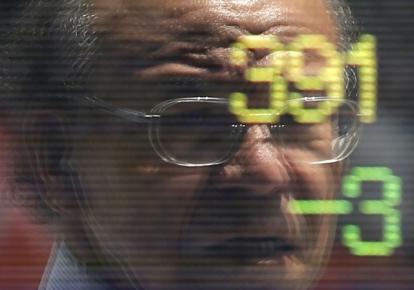Asia Shares Extend Bounce, Oil Pinned Near Lows
Bareksa • 12 Aug 2014

A man is reflected in an electronic stock quotation board outside a brokerage in Tokyo July 14, 2014 - (REUTERS/Issei Kato)
The pan-European FTSEurofirst 300 index jumped 1.3 percent after losing 2 percent last week.
Bareksa.com - Asian shares edged higher on Tuesday tracking rallies in the United States and Europe as investors seemed to put aside geopolitical concerns, at least for the moment.
MSCI's broadest index of Asia-Pacific shares outside Japan added 0.3 percent after jumping 1.5 percent on Monday. Japan's Topix rose 0.4 percent, while the Nikkei firmed 0.3 percent.
The better mood came even though NATO chief Anders Fogh Rasmussen warned of a "high probability" that Russia, using the guise of a humanitarian mission, could intervene militarily in Ukraine.
Ukraine has also said that, contrary to Russian reports of de-escalating, Russia has massed 45,000 troops on its border.
Investors also monitored Iraq, where the United States recently began air strikes targeting Islamic State fighters marching on the country's Kurdish capital.
In Baghdad, the political showdown continued as Nuri al-Maliki refused to bow to U.S. and Iranian pressure to step aside after Iraq's president named a less polarizing prime minister.
None of this seemed to faze Wall Street, where the Dow rose 0.10 percent, while the S&P 500 gained 0.28 percent and the Nasdaq 0.70 percent.
Eight of the S&P's 10 primary sector indexes ended higher. Consumer staples shares posted the highest increases as the sector's index rose 0.8 percent, while energy and utilities shares dragged.
Shares of Kinder Morgan Inc, the biggest U.S. pipeline company, jumped 9 percent on news it would put all its publicly traded units under one roof in a $70 billion deal.
An MSCI index of stocks in top developed and emerging countries rallied 0.8 percent on Monday, the most for any day in four months, though it was still down more than 3 percent from a record closing high set early in July.
The pan-European FTSEurofirst 300 index jumped 1.3 percent after losing 2 percent last week.
Yet there was enough of a safe-haven bid to keep Treasuries underpinned with yields on U.S. 10-year paper at 2.429 percent, not far from last week's 14-month lows.
Major currencies were fenced in narrow ranges, with the U.S. dollar index flat at 81.470 after drifting in a 82 tick-range on Monday, a far cry from Friday's 336 tick-range.
The dollar bought 102.22 yen, off Friday's low of 101.51, while the euro fetched 136.82 yen, still well off a trough of 135.73 plumbed on Friday.
Geopolitical concerns and sanctions against Russia will probably be reflected in a closely watched survey on German morale due later in the day, analysts at BNP Paribas said.
"We expect the headline expectations measure to fall to its lowest levels since the immediate aftermath of the EUR crisis in early 2013," they wrote in a note to clients.
Such an outcome might keep the euro under pressure. The common currency last traded at $1.3384, still struggling after hitting a nine-month low of $1.3333 a few days ago.
In commodities, oil prices remained in a rut amid plentiful supply. Brent crude futures eased 13 cents to $104.55 a barrel, while U.S. crude lost 18 cents to $97.90 per barrel.
Spot gold was flat at $1,308 an ounce. (Source : Reuters)